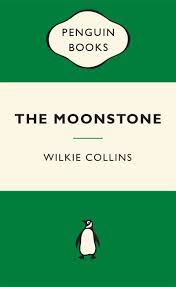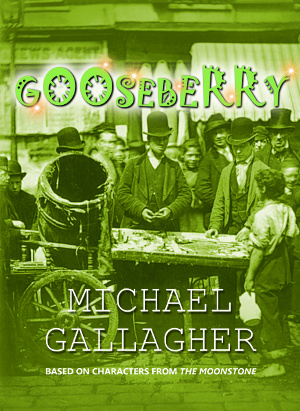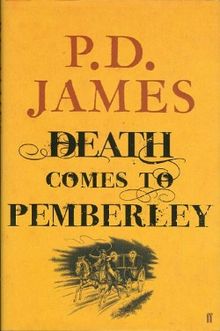
Espionage, murder, romance and humour; this novel has them all.
Considered by many to be the inaugural detective novel, Wilkie Collins’ nineteenth century novel ‘The Moonstone’ is a classic.
What’s it about?
A precious gem is stolen, a curse follows the thief and three Hindus sacrifice their caste to retrieve it.
This brief précis gives the novel a certain exoticism, and it’s true that India bookends the story, but really it’s a whodunnit set in a country house. The main action focuses on a period of about a year and a half during which the sought-after diamond is stolen – again – from a Miss Rachel Verinder, mere hours after she receives it.
From this point, puzzles abound. Who stole it? Why won’t Miss Rachel support the police investigation? What have the three Indians who were hanging around the house got to do with the theft?
Some of the answers initially seem obvious, but as the story develops there are several strange twists and turns that place the initial events in a very different light.
What’s it like?
A little slow and repetitive in places due to the narrative structure, but there’s no shortage of surprises and puzzles to keep readers intrigued, including an excellent twist half-way through.
Really it’s a whodunnit set in a country house.
The novel is carefully constructed from “documents”, most of which are eyewitness statements commissioned by one of the key characters in the tale. Just like Collins’ most famous work, ‘The Woman in White’, the central conceit is that each section is written by a character who is limited to telling you what they did, thought, saw and suspected at the point in the story they are writing about. This necessarily creates a little repetition at times but the narrowness of each character’s vision is what contributes so effectively to the suspense.
Furthermore, some repetition is deliberate and quite helpful to the reader. Since the novel was originally serialised in Dickens’ magazine ‘All the Year Round’ between January and August 1868, contemporary readers would have appreciated judiciously timed reminders of events which had happened in previous instalments. Reading this on an ereader meant I found it difficult to toggle between sections and so found the discreet recaps equally useful!
So has it stood the test of time?
Definitely; the aristocratic characters may have fewer real-life counterparts today, but the emotional heart of the novel rings as true as ever.
To fully appreciate this, you need to enjoy reading a lot of dialogue and accept a slow pace to the development of the mystery. The formal structure Collins adopts means the novel consists mostly of dialogue as characters explain all the key incidents to each other. This does create a certain distance and reduces the dramatic impact but is essential to create the suspense: if we had (for instance) Rosanna Spearman’s account of events from Rosanna Spearman’s own mouth, instead of recounted second-hand and then by letter, this would be a much shorter and far less puzzling story. Besides which, much of the enjoyment is found in the characterisation and the narrative approaches.
“I have myself (in spite of the bishops and the clergy) an unfeigned respect for the church”
The narrators have very distinct voices and I particularly enjoyed the first two significant voices: Gabriel Betteredge and Miss Clack. Betteredge’s narrative initially consists of a series of digressions followed by assurances of future progression of the mystery, but he’s also sharply, wonderfully opinionated:
“Rosana Spearman had been a thief, and not being of the sort that get up Companies in the City, and rob from thousands, instead of only robbing from one, the law laid hold of her”.
“I have myself (in spite of the bishops and the clergy) an unfeigned respect for the church”
“I can’t affirm that he was on the watch for his brother officer’s speedy appearance in the character of an ass – I can only say that I strongly suspected it.”
“I am (thank God) constitutionally superior to reason.”
If you find the above quotations from Betteredge amusing then you’ll likely find this a rewarding read, and by the time Betteredge retires from his position as narrator you’ll be suitably hooked by the mystery to keep reading.
The next narrator, Miss Clack, is horribly evangelical with no empathy at all, but once her hypocrisy is unveiled she is equally enjoyable in her own way, and I quickly adapted to each new speaker and their quirks.
Final thoughts
I enjoyed reading this and was suitably perplexed by the central mystery. I found the various twists and turns interesting, though you do have to be prepared to suspend disbelief about a few key points.
Having finished this, I’m tempted to reread ‘The Woman in White’, which I remember enjoying, but I’m wondering whether I should branch out and try something else from Collins’ works.
Have you read any of Collins’ less famous novels? If so, would you recommend them?
‘The Moonstone’
Wilkie Collins
2012, kindle, ereader
P.S. You may have noticed that the front cover I’ve uploaded doesn’t match the edition I’ve actually read. It just so happens that I also own a copy of this book in paperback because, y’know, I forgot I already owned it when I spontaneously downloaded it, you can’t own too many physical books, and the paperback has a nicer cover.


